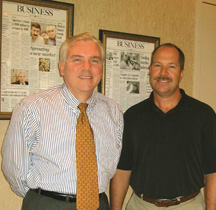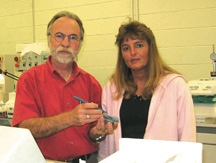By Cathy Ciccolella
Senior Editor
BALTIMORE--Spectera is on the move.
With the pending $8.1 billion acquisition by Spectera parent UnitedHealth Group of PacificCare Health Systems expected to sharply increase its vision-plan participation on the West Coast, Spectera executives are working to prepare for an influx of new members while devising improvements in its current members’ benefits.
At the same time, the company is constantly upgrading its state-of-the-art optical laboratory, Crown Optical, while deciding how best to increase capacity to handle the flow of new members in the future.

|
| Spectera’s David Hall (l) and Tom Davis |
But it’s a good position to be in, according to Spectera’s top executives, president and chief executive officer David Hall and Tom Davis, executive vice president and chief marketing officer, who are used to adapting to rapid growth.
The $250 million company currently serves 13.7 million members (all funded lives), up from-about 8.7 million at the end of 2003. Its provider network has expanded to about 22,000. Sixty percent of Spectera’s providers are private-practice eyecare practitioners (about 11,800 optometrists and 1,300 ophthalmologists), while the rest represent retail optical chains. And the network continues to grow at the rate of about 200 providers per month, according to the company, which was formed in 1964 to provide vision insurance as part of a Taft-Hartley labor fund.
Today Spectera is a division of Specialized Care Services, a wholly owned subsidiary of UnitedHealth Group. Hall, who became Spectera’s CEO in 1997, has also headed Specialized Care’s dental operation for the past two years. “In 2003 we started integrating our vision and dental sales and marketing teams, because we sell to many of the same people,” Hall explained.
On the vision-care side, Spectera has been making strong moves to boost its profile (through support of industry organizations and consumer outreach programs), its member benefits and its client roster--and making those moves while marching to its own drummer.
“We made a decision in 1997 to stop trying to be like other companies,” recalls Davis, a managed-vision veteran who spent about 10 years with Vision Service Plan before joining Spectera. “We need to try to make other companies be like us.”
In its efforts to, as Davis put it, “be ahead of the marketplace,” Spectera has in recent years:
- Offered a paid-in-full contact lens benefit.
- Expanded its provider network to include optical-industry chains, taking the number of chain locations in the network from about 1,000 to close to 9,000.
- Introduced a price-based frame allowance, currently a $130 retail credit.
- Used the latest technology to streamline member and provider transactions.
In terms of member services, “we’re constantly raising our benefits,” Davis said. For 2005, that meant boosting the frame allowance and broadening consumer options in the contact lens benefit.
This year Spectera also established a relationship with OptiCare Health Systems to provide medical/surgical coverage--an effort just getting underway in Texas. Spectera also offers members a discount on laser vision correction through an alliance with LCA-Vision.
Declared Hall, pointing out that Spectera has among the lowest out-of-pocket costs to members in the industry, “Consumer value is our priority.”
The Spectera executives are quick to acknowledge that some of the company’s growth has come from the wider acceptance of vision plans in general among employers, as well as from providers’ changing attitudes toward managed vision.
“It used to be that when our sales team visited a prospective client, the biggest battle was explaining what a vision plan was,” Hall noted. “Now vision care is an accepted concept as part of an employee benefit package.”
“The market is maturing to the point where fewer employers offer health plans without some form of vision benefit,” Davis added. “Today, we’re bidding against existing plans rather than trying to convince the employer why he or she needs a vision plan in the first place.”
On the provider side, “some doctors used to say they’d never participate in a managed-care program, but they now have adjusted their practice to the managed-vision environment and are making money,” Davis told VM. “For some, managed care was off their radar, but today they’re beating the drum because they’ve been exposed to the market being driven by managed care.”
To help boost awareness of managed vision in general, Spectera has been a strong supporter of the National Association of Vision Care Plans (NAVCP) from the beginning; the firm was one of the five founding member companies that met to form the group in November 2002, providing “seed money” for its launch, according to Hall.
Davis was the first NAVCP president when the organization officially came together the following spring; he currently serves as NAVCP secretary.
Noted Hall, “Tom has been a leader in managed vision and how it’s progressed.”
Lab Talk
An important part of Spectera’s
success story is its Crown Optical laboratory, located across the
city from the company’s headquarters. The lab’s 188
employees currently turn out about 2,100 jobs a day, for both
independent retailers and eyecare practitioners who are members of
Spectera’s managed-vision provider panel--and are required to
use the Crown Optical lab for plan members’ eyewear--and its
own United Optical stores.
Provider-panelists’ orders represent about 60 percent of the lab’s work, while the remainder goes to the United Optical stores, Richard Mecteau, who heads Crown Optical as senior vice president, told VM. The lab does no outside work.
This year Crown Optical is expected to handle about 600,000 prescriptions, up from about 500,000 in 2004, he said. “We did about 800 prescriptions a day when I started here six years ago,” Mecteau declared. “Now we’re up to about 2,200 a day.”
Mecteau is proud of the lab’s state-of-the-art equipment and its constant work-flow improvements. Crown Optical updates its equipment frequently; Mecteau attends multiple trade shows in this country and abroad to keep current on the latest technology, and the lab frequently serves as a Beta test site for equipment manufacturers’ newest prototypes.
“We spend a lot of time and energy on Beta testing, because it’s worth it,” Mecteau explained. “And when we decide to purchase new equipment, we tend to reorganize where our equipment is positioned to make sure we have the best possible production flow--so basically we’re continually redesigning the lab and planning for our next step at the same time.”
That planning sometimes means deciding on the best way to accomplish a particular task in the lab, then finding a machine to do it Crown’s way, rather than adapting the lab’s processes to fit available equipment’s capabilities. “We’ve often had manufacturers modify their machines for us, to do something we’ve decided is the optimum way to do it,” Mecteau noted.
The lab is heavily computerized, from order entry and tracking to actual lens production. Current equipment in use includes four computerized Loh blockers, plus a new Loh Auto-Blocker S on loan for evaluation, and a Schneider CCP 102 robotic polisher with disposable tool pads that Mecteau said can replace 7,000 individual tools now in stock in the lab.
“But with all the automation, we keep hiring people, because we’re growing,” he noted. “And one thing that makes life easier is that we know our growth rate ahead of time, since managed-care contracts are sold months in advance.” Mecteau also points proudly to the fact that Crown Optical has never had a layoff of lab employees in its 30-year history.
One recent addition to the lab is a special area for low-vision jobs, created in March. “Low vision is kind of a ‘lost’ field, with not many labs doing that kind of work,” he told VM. “But we’re now doing about 35 specialty jobs a day, including low vision.”
Crown Optical works with a broad variety of lens brands; it is also a distributor for Varilux and Zeiss lenses.

|
Richard Mecteau, head of Spectera’s Crown Optical lab near its Baltimore headquarters, goes over an order with Barbara Benfield, the lab’s low-vision supervisor. |
Mecteau has noted a doubling of progressive lenses’ share of the lab’s work, to about 40 percent of total jobs, over the past five years; Crown Optical also does considerably more high-index, polycarbonate and three-piece-mount Rxs now, he said, noting an increase as well in anti-reflective lenses to about 25 percent of total jobs. The lab also fills about 400 contact-lens orders daily.
Noted Spectera’s Davis, “The lab has kept us at the leading edge of the industry.”
United Optical
In addition to its managed-vision
operations and its Crown Optical lab, Spectera also owns United
Optical, a retail chain that opened its 55th location--in Mentor,
Ohio--in mid-July.
About half of United Optical’s stores are clustered in Maryland, Virginia and Washington, D.C.; the rest are located in Texas (four stores), Ohio (10) and Southern California (15).
The chain--which, along with seven stores under the name Georgia Optical that are also owned by Spectera, did about $45 million in optical revenues last year--derives much of its sales from members of its parent’s vision plans.
“We try to build a good managed-care business--that’s our foundation,” Tom Heeter, director of optical operations, told VM.
What’s
Ahead?
Spectera’s management team is
currently planning for the impact of the PacificCare acquisition,
expected to close late this year or early in 2006.
“We’re anticipating member growth on the West Coast, so we need to take steps,” Hall said.
One of those steps may be the addition of a second lab, under discussion for several years but brought into sharper focus by the pending acquisition. “We could buy a lab, build one, or partner with someone else,” Hall noted. “We want to decide by the fourth quarter so we can implement that decision in 2006.”
Next year will also bring additional improvements in plan benefits, including a new discount on second-pair purchases, as well as “other enhancements,” according to Davis. “We continue to upgrade our plan every year to stay ahead of the competition,” he declared.











